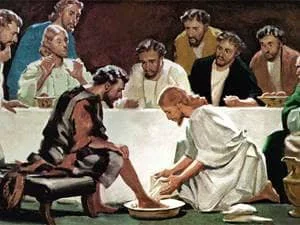Many Christians get this wrong.

The Bible is full of wisdom, but it is often misquoted and misunderstood. The same goes for Jesus' words. While the teachings of Jesus only lasted around three years prior to His death, in that short amount of time a tremendous world of truth, myth, legend and superstition was built around Him. Even though Christians share a certain set of beliefs that they hold as essential to their faith, there are a wide range of interpretations and opinions when studying the Bible. Today, readers and carriers of the message often hear particular verses and passages in ways they were not intended to be heard. While the Bible is often quoted, it is just as often misquoted. The problem comes when people turn God's word into a collection of quotes and one-liners and don't pay attention to the context of the verse, or the history behind the text. Nothing's wrong with connecting with a specific line of Scripture, but it's important that you know what the verse really means, particularly if you are living by the Word and professing it to others. Here are five teachings from Jesus most people get wrong.
Matthew 5:3

Matthew 5:3 says, "Blessed are the poor in spirit: for theirs is the Kingdom of Heaven." Most Christians interpret 'poor in spirit' to mean a false piety cultivated by poverty of personality or material wealth, when it actually means we must be humble in our spirits. If you put the word "humble" in place of the word "poor," you will understand what He meant. In other words, when we come to God, we must realize our own sin and our spiritual emptiness and poverty. We must be not be self-satisfied or proud in our hearts, thinking we don't really need God. If we are, God cannot bless us. The Bible says. "God opposes the proud but gives grace to the humble" (James 4:6).
Luke 10:30-27

Parables are familiar to many people, but not always correctly understood. One commonly misunderstood parable is the very familiar parable of the Good Samaritan. We all know what it means when you call someone a "Good Samaritan." That generally means that someone shows kindness, mercy, compassion, care to some other person in need. However, during the time, the Samaritans were not thought of as such. In addition to our popular misunderstanding of the Samaritan, the parable of the Good Samaritan is largely misunderstood. The story is not to make people feel guilty about not giving their money to poor people. It's not to make people feel guilty about not taking care of those that are suffering. This story is designed to make people feel guilty for not loving God perfectly and loving others perfectly, and then running to the One who alone can provide forgiveness for that sin and eternal life.
Matthew 6:19

When Jesus said, "Do not lay up for yourselves treasures on earth" (Matthew 6:19), the term "lay up" is often believed to mean "having possessions." But it did not simply speak of having possessions, but of your possessions having you. The term "lay up" is better understood as a hoard. In this passage, Jesus is not saying that it is wrong to have things as many often believe. He was warning against becoming materialistic or letting things become more important than God. God created us to love people and use things, but a materialist loves things and uses people. Jesus did not lift up poverty as some great virtue. In fact, only one time did He tell someone - the rich young ruler - to sell his possessions and give to the poor. The rich young ruler was possessed by his possessions. When Jesus said, "If you want to be perfect, go, sell what you have and give to the poor, and you will have treasure in heaven; and come, follow Me" (Matthew 19:21), the Bible says that he went away sorrowful. This was a test to see whether God was more important to him than his things.
Luke 17:21

Luke 17:21 says, "Neither shall they say, Lo here! Or, lo there! For, behold, the kingdom of God is within you." Jesus was trying to solve the timeless problem many spiritual seekers encounter that of thinking God, Heaven or Divinity is an external place or entity. "Within you" comes off as an unfavorable translation, seeing that Jesus was speaking to the Pharisees at the time. Jesus was surely not saying that the Kingdom of God resided within the Pharisees' hearts. The Pharisees opposed Jesus and had no relationship with God. The better translation would be "in your midst" or "among you." Jesus was telling the Pharisees that He brought the Kingdom of God to earth. Jesus' presence in their midst gave them a taste of the kingdom life, as attested by the miracles Jesus performed.
Matthew 7:1-5

People often take this verse to mean that Jesus says not to judge. This is usually in the context of someone committing some wrongdoing, and the person responding with "Who am I to judge?" We're all sinners and God calls us to judge not, right? Not quite. Contrary to popular belief, Matthew 7:1-5 is not a prohibition against all judgment. These verses are a warning against hypocritical judgment, not judgment in itself. Jesus is saying we can't judge others when we are guilty of the same sin. What people fail to realize is when they interoperate this verse in this way, they are declaring a judgment on the person who they are claiming is being judgmental. If you dive further into the passage, Matthew is not forbidding judgment but hypocrisy. This is why the context is so important. You have to read the surrounding text to understand the verse. What Jesus is doing in this full passage is passing judgment on those who improperly judge. We know from continuing to read the verses that we will all be judged by the same measure that we use. If we can't apply this standard to our own lives, we can't apply this standard to others.

The Bible continues to be one of the most misquoted and misunderstood texts, and Jesus one of the most misquoted and misinterpreted historical figures. As Christians, we want to get Jesus' words right, but many of us have turned away from the truth and bought into these misinterpretations. It's important that we hear the words and parables as Jesus' own audience did so we can fully experience their power. When we do this, we fill find ourselves surprised and challenged.
















Comments